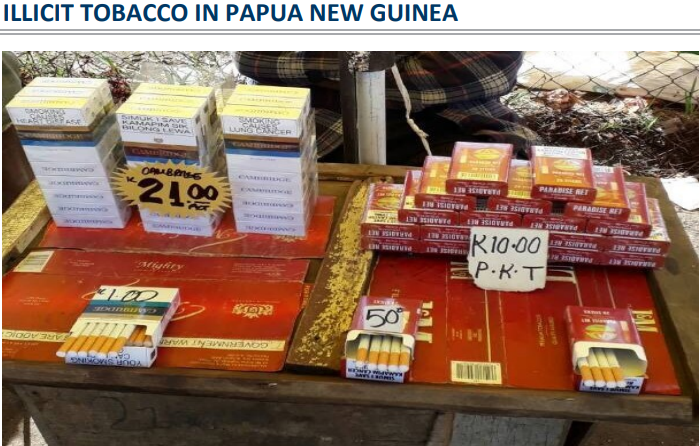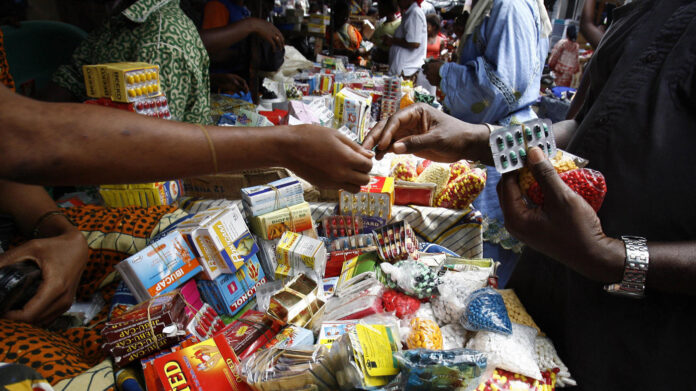By ROBINA MORRE
ILLICIT trade is any practice of production, shipment, distribution, sale or purchase of goods that is prohibited by the law. Fake goods are goods of often low quality, made or sold under another’s brand name without the brand owners authorization. Illicit trade and fake goods is a major and growing problem worldwide. In Papua New Guinea, the issue is greatly affecting the country’s revenue and also affecting local manufacturers and distributors.
Many of the products sold on shelves in stores today are contraband or counterfeit goods. For example, cigarettes, fake SP beer, Chinese-made string bilums and meri blouse dresses, counterfeit tinned fish and many more other products. All these counterfeit products have passed through right under the noses of those who are supposed to be protecting the borders, and citizens of Papua New Guinea.
With these fake products dominating the PNG markets, it is causing a great depression in the country’s economy. The government is losing billions of Kina in tax revenues, because these products have not been checked properly by border agencies, mainly Customs, so these products are not contributing in paying their taxes back to the government.
Local businesses are also being sabotaged by illicit trade and consumers are being exposed to goods that are poorly made and unregulated products.
Late last year Post-Courier reported that, local beer manufacturer, South Pacific Brewery confirmed there has been existence of a fake beer product being sold in Port Moresby. It was brought to their attention after consumers that purchased the fake products reported that the taste was not normal to the genuine product produced by the company. It was being packed illegally in similar looking cans of its SP Lager green can brand. After obtaining samples of the product to confirm with its own manufactured green can lager product, details of the can, looks exactly the same, but the content confirmed it was counterfeit.
Two Chinese men were later arrested by the Policing the Police Task Force Team over the illegal sale of fake SP Beer in the National Capital District.
The production of foreign made fake bilums and fake meri blouses is also affecting local SME’s (Small Medium Enterprises) in the country and also breaching Papua New Guinea’s National Law. For many years, PNG mothers depend on the production and selling of bilums and meri blouses to look after their families, pay for their children’s school fees and manage their households. With the introduction of fake foreign produced bilums and meri blouses, it has greatly affected their sale because the Chinese-made products are much cheaper and made neatly that it has attracted a lot of customers. Making local bilum and meri blouse makers to lose their customers, as everyone is going for the cheaper and neatly made products which is also fake.

In August last year, then Minister for Commerce and Trade, Wera Mori gave foreign investors who are selling the fake products, until the end of the month to get rid of their fake products otherwise they would be dealt with by the law.
“I am calling on our foreign investors who are actually here in this country also while doing their business they must note and understand that there must be respect for PNG culture, by the same token our customs must be diligent and they have got to remove such items when they are imported in bulk commodities for commercial purposes,” Minister Mori said.
He said the bilum string bag is a reserved activity under the Investment Promotion Authority Act 1992, indicated under the cottage business activities list.
After turning a blind eye on the warnings given, Papua New Guinea took a stand for their culture and their indigenous artifacts. The creative art of weaving a ‘bilum’ is sacred to PNG women who spend days and weeks to make them and has been passed on for generations. PNG Customs Services with the help of fellow stakeholders and local representatives burnt all fake bilums not made in PNG.
Another major distributor who is very much affected is the British American Tobacco (BAT). BAT director Naved Manzoo said that, Illicit trade alone is causing the PNG economy K250 million in lost revenue annually. So to rectify the issue a memorandum of agreement (MOA) was signed on September 5th 2017 between the tobacco company and the Royal Constabulary to combat this crime.

BAT PNG ltd external affairs manager David Towe in his presentation on illegal trade in Tobacco products highlighted a few recommendations to combat the illegal trade of cigarettes.
Mr. Towe said that there was work to be done between businesses and Government to review penalty provisions that applied with the laws that regulated international trade across board.
“The trademark infringement is a key one,” he said.
Our trademark is our business. Business rely on their trademark to do their business and we expect Government to protect our trademark. BAT, as the major manufacturer and distributor of tobacco in PNG, believes that one-third of the cigarette industry is illegal: That equates to about 600 million sticks of cigarettes illegally imported and sold. That 600 million sticks equate to some K150 million in lost excise tax and revenue to the Government and people of Papua New Guinea. K150 million kina is a lot of money. That can do a lot for our mothers and children out there in the communities.
PNG Manufacturer Council also raised concerns over the rise in illicit trade and reaffirms the call to have an independent task force on illicit trade. Chief executive officer Chey Scovell made this call after illegal cigarettes were confiscated by the Police Drug and Vice Squad at Kennedy Estate in Port Moresby.
One of the initiative that the government has put in place which British American Tobacco highly commends is to set up an anti-illicit trade taskforce to combat the illegal trade of cigarettes in Papua New Guinea.
According to Post-Courier report on December 17, 2018, Scovell announced that there was a great need to effectively establish an Illicit Trade Taskforce after analyzing the data from Customs, Bank, International Trade and Market and it showed a gap between the claimed and the actual values and quantities of goods being imported or exported. On April 17 2018, ministers and heads of agencies met at the Department of Justice and Attorney General (DJAG) to discuss the establishment of the illicit trade task force.
Mr. Scovell said PNG Customs, however, have not supported that position and instead have sought to maintain the current practices.
“They are not supportive of a body that adds a layer of scrutiny to their business practices,’’ he said.
“Despite the Treasury providing K500,000 this, and industry funding over K700,000 thus far, as at today’s date (14,12,18), the Taskforce remains unstaffed and, as such, has not been established,’’ he said.
Up until today, there is still no Illicit Taskforce team to tackle the problem in the country. With very little manpower available in the Police workforce, they are trying their very best to keep watch of illicit trade around the country.
The issue on illicit trade and production and trade of fake products is ongoing and will continue to affect the economy as long as the government turns a blind eye on it. All these fake counterfeit products have been introduced into the country with illegal foreigners flooding into the country to startup businesses. The Asians are taking over our country with the introduction of their counterfeit products and we can’t do anything about it, unless our government border security agencies take their job seriously and conduct proper inspections on every imported product into the country to make sure that they are legal.

